
Galing Pook Contents 3 4 5 6 6 7 7 8 10 12 14 16 18 20 22 24 26 28 32 34 35 The Galing Pook Global Public Innovation Network Message from President Benigno S. Aquino III Honoring the Brilliance of LGUs DILG Secretary Jesse Robredo Promoting a More Inclusive Growth Process GPF Chair Ma. Nieves Confesor Development Strategies Worth Emulating LBP Pres. and CEO Gilda Pico Supporting Innovative LGU Initiatives DBP Pres. and CEO Francisco del Rosario, Jr. Justice on Wheels Sarangani Poor Municipality Can Eliminate Malnutrition Limasawa, Southern Leyte Turning Red to Green Misamis Oriental Rural Community e-Center Upi, Maguindanao LGU-Led Cadastral Survey Maribojoc, Bohol Empowering the Subanen People Zamboanga del Norte Community-Based Mental Health Management Real, Infanta, Gen. Nakar, Panukulan Bringing High Schools Closer to Home Alimodian, Iloilo Rabies Prevention and Elimination Bohol Health Strategy for MDG Attainment Albay 2011 Galing Pook Awards Finalists 2011 National Selection Committee Galing Pook Foundation Board of Trustees and Secretariat Galing Pook Hymn Cover Design, Layout and Main Articles by Allen M. Mariano • References supplied by LGUs • Photos courtesy of LGUs and from Galing Pook File Photos 2 • Galing Pook 2011
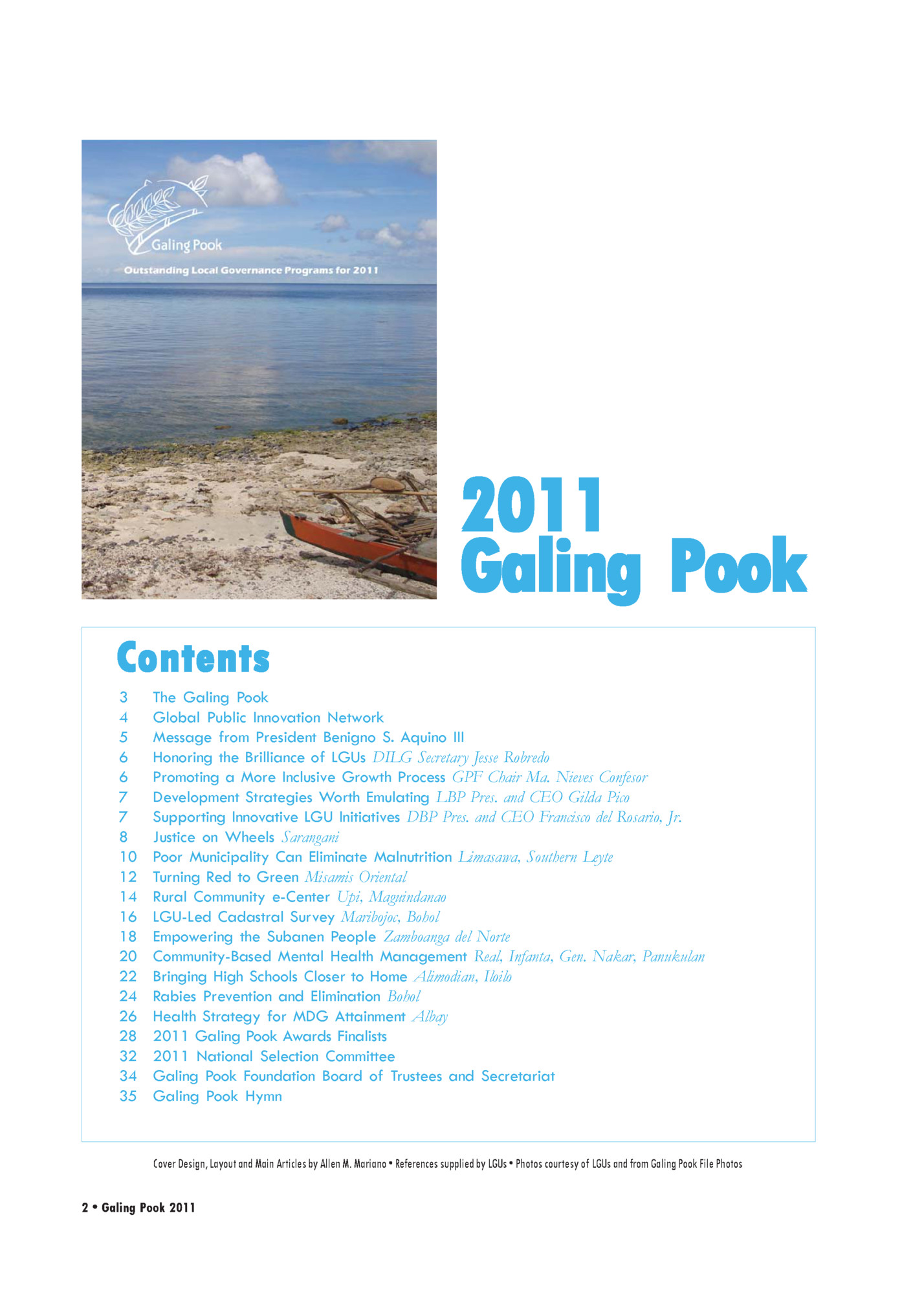
The Galing Pook T he Galing Pook awards is a pioneering program that recognizes innovation and excellence in local governance. It started in October 21, 1993 under the joint initiative of the Local Government Academy-Department of the Interior and Local Government, the Ford Foundation, and other individual advocates of good governance from the academe, civil society and the government. The Asian Institute of Management carried on the awards program until 2001. Earlier in 1998, the Galing Pook Foundation was formed as a juridical institution to sustain the program. Since 1994, more than 250 programs from at least 160 local government units and alliances have already won recognition. The Galing Pook winners are chosen each year from a wide array of programs from local governments after undergoing a rigorous multi-level screening process. The winning programs are selected based on positive results and impact, promotion of people’s participation and empowerment, innovation, transferability and sustainability, and efficiency of program service delivery. Vision We are a leading resource institution that promotes innovation, sustainability, citizen empowerment, and excellence in local governance. Mission We promote excellence in local governance through recognition, sharing of information and support of efforts to replicate best practices at the local level. We encourage partnerships among civil society organizations, private sector, and government agencies at local, national and global levels to improve quality of life. artners Par tners Galing Pook 2011 • 3
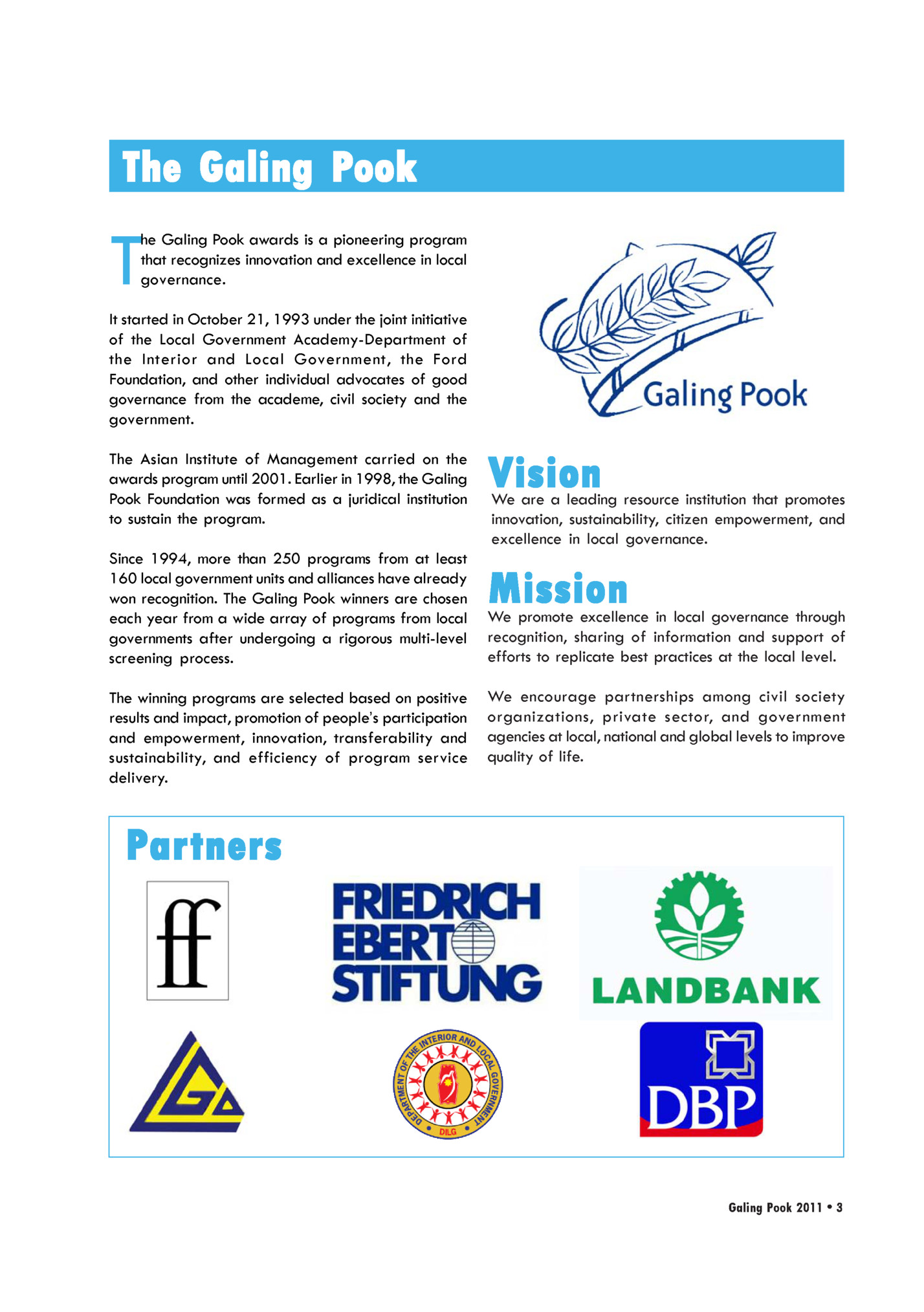
T he Global Public Innovation Network, established in 2002, is a collaborative network of 10 public policy awards programs from around the globe. With support from the Ford Foundation and contributions by the individual programs, the Innovation Network gathers and disseminates knowledge about innovations in public service provision, public action, and governance. These innovations represent significant contributions to the collective well-being of citizens and to the reduction of social, economic, political, gender, and ethnic inequalities. By sharing successful local practices through an international network, the impact of each awards program can extend far beyond its country’s borders. Innovation Network activities include workshops, research, and publications. Partner Programs The Global Public Innovation Network includes the following programs: American Indian Tribes in the United States of America: Honoring Nations Program Brazil: Public Management and Citizenship Program Chile: Citizen Participation and Public Politics Program China: The Innovations and Excellence in Chinese Local Governance Program East Africa: The Mashariki Innovations in Local Governance Awards Program Mexico: Government and Local Management Award Peru: Participation and Local Management Program Philippines: The Galing Pook Foundation Awards for Outstanding Local Government Programs South Africa: Impumelelo Innovations Award Trust United States of America: Innovations in American Government Awards Program Source: Harvard Kennedy Sc hool: Ash Center for Democratic Governance and Innovation Website (http:// www.ash.harvard.edu/Home/Programs/Innovations-in-Government/Global-Public-Innovation-Network), accessed January 5, 2012. 4 • Galing Pook 2011
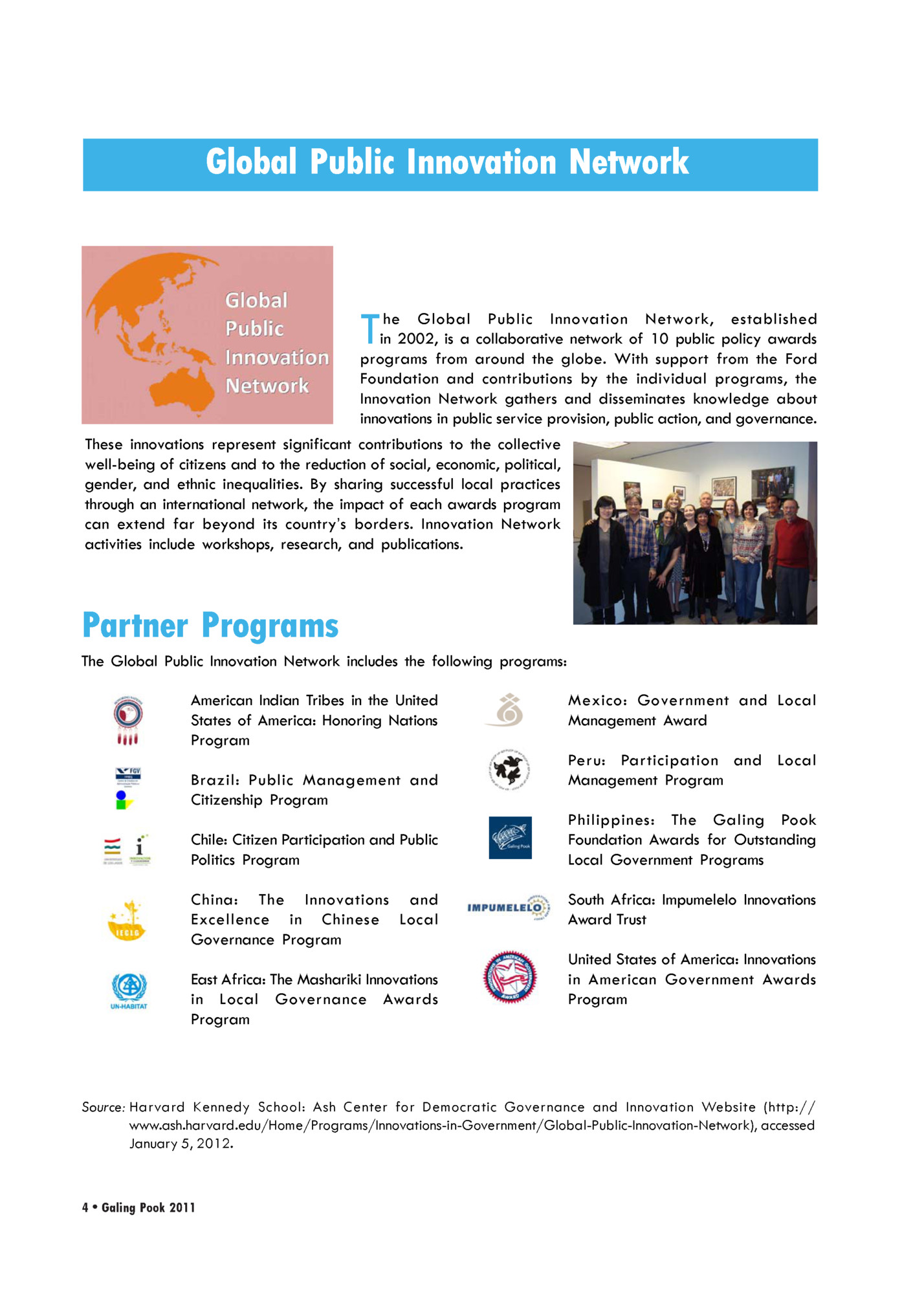
Manila It is my pleasure to congratulate the recipients and finalists of the 2011 Galing Pook Awards, and I commend the Galing Pook Foundation for spearheading this annual recognition of exemplary community programs. Local government units are our key partners in implementing reforms at the grassroots level, serving as the national government’s arm in ensuring an environment of equitable progress. This occasion demonstrates your commitment to uphold the system of decentralization with efficiency and excellence. The innovative activities that the awardees and finalists have carried out in their respective localities redound significantly to our agenda of good governance, which includes the resolution of socioeconomic issues such as poverty, health, and peace. Thus, I applaud your steadfast dedication to work toward the fullest development of your territories. Your initiatives indeed strongly contribute to forging self-reliant communities. May your endeavors inspire others to foster dynamism in public service. I exhort our LGUs, represented by the different local leaders, to sustain accountability and transparency in fulfilling our Social Contract with the Filipino people. May our paths be guided by our aspiration for genuine reforms in this time of renewal. BENIGNO S. AQUINO III Manila January 2012 Galing Pook 2011 • 5

T he Department of the Interior and Local Government would like to extend its sincerest congratulations to the 2011 winners of Galing Pook Awards. Galing Pook Awards does not only recognize but more importantly honors the brilliance of local government units that continue to provide stories of hope and inspiration as a proof that good governance is alive and thriving in the country. I salute the LGUs that have taken part and showcased the best practices in their localities. It is my fervent hope that they sustain and upscale the efforts they started. I would also like to acknowledge our strategic partners from the private sector and the civil society organizations for their continued efforts in helping us promote good local governance. Jesse M. Robredo Secretary I believe that by working hand in hand we can make positive changes in the lives of our Department of the Interior people. and Local Government Congratulations and Mabuhay! Promoting a More Inclusive Growth Process T oday, we recognize that millions of poor Filipino families, including many women and children, in both rural and urban areas, continue to be left behind even as the country's economic prospects have improved. The challenge is to promote a more inclusive growth process --- one that sustains competitiveness and robust economic growth performance, while ensuring that wealth creation provides the widest possible benefits, notably for the expanding low-income population. Growth alone, while critically important, does not necessarily alleviate poverty and reduce inequality. There is convincing evidence that inequality does retard growth and render growth to be "sporadic" and short-lived in developing economies such as ours. Thus, eighteen years and more than 250 awardees later, the search for innovative sustainable arrangements are "cocreated" by local governments and communities, even in the most challenging of conflict conditions, to ensure that growth is for ALL, and not captured by an elite. "Acting locally", such local governance mechanisms have been sustained by transparency, clear accountability, expanding inclusion of all stakeholders, and their increasing empowerment. For many of those in leadership, whether exercised with authority or not, the choice to lead has been marked by courage to create. For many of those who have been recognized, the programs have produced leaders, not with the capital "L", but by a growing band of innovators, leaders with a "small l", as some would say. Such courage would account for re-configuring the system and multi-sectoral relationships for the early attainment of millennium development goals in the province of Albay; mobilizing a 6 • Galing Pook 2011 systemic approach to eliminate rabies in the province of Bohol; for achieving zero-mortality rates for Limasawa, Southern Leyte; for an LGU-led cadastral survey, with simultaneous systematic adjudication to address the conflict "fall-out" from clearly plotted lines and boundaries; establishment of an inter-local health zone for community-based mental/psychosocial health management; creation of strategically located and much needed high schools in barangay clusters in Alimodian; and the first community e-center in the country in Upi. Peace-building initiatives, through Misamis Oriental province's Lantad Peace-building Experience and Zamboanga del Norte's program to bring the lumads to access mainstream services, continue to be recognized. Sarangani's JEEP (Justice Enhancement and Empowerment Program) creates "inclusive growth" by bringing the justice system to the people, by setting up mobile courts, among others, with clear results. Organizations, be they public or private, fail to create the future not because they fail to predict it but because they fail to imagine it. Congratulations to the awardees and finalists! They have imagined and they have created. Ma. Nieves R. Confesor Chairperson Galing Pook Foundation

F or yet another remarkable year of worthy causes, LANDBANK commends all the winners of the 2011 Galing Pook Awards who have made tireless efforts to effect changes especially in hard-to-reach communities. We also laud the Foundation for continually finding new and innovative measures to help people attain economic growth and sustain livelihood projects. Having programs sparked by local governance is a clear indication of the significant strides of LGUs in empowering people and their communities toward a culture of responsible economy. We are more than grateful for the commitment they have shown in providing lasting opportunities of employment and development strategies worth emulating by other institutions and societies. With the success of LGUs in implementing projects of socio-economic influence, the nation is well on its way to a quality of service that is anchored on efficient delivery of basic needs in education, health, housing, and other basic services that will soon be standard among all Filipinos. As the LGUs continue to promote avenues for model countryside development, so shall LANDBANK remain a dedicated partner in advancing your public service objectives ripe with sustainable impact. Gilda E. Pico President and CEO Land Bank of the Philippines To the 2011 Galing Pook Awardees, a well-deserved congratulations! Supporting Innovative LGU Initiatives T he Development Bank of the Philippines congratulates the winners of the 2011 Galing Pook Awards. Truly, your stories have shown how powerful our local government units are in promoting progress in their communities, particularly those in the countryside. Francisco F. Del Rosario, Jr. President and CEO Development Bank of the Philippines DBP has been a staunch ally of the Galing Pook Foundation in recognizing the best practices in local government in line with the bank’s commitment to promote good governance in the country, particularly on the local level. We in DBP believe that good governance results to the responsible use of public funds, growth of local communities and efficient delivery of services. We encourage our local government units to adhere to the anti-corruption and good governance directives set by President Benigno S. Aquino III. As one of the two policy banks of government, DBP will remain steadfast in supporting the initiatives of our local government units. We have more than P69billion in available funds to support various priority projects, particularly in the areas of infrastructure and logistics, environment, social services, and micro and small enterprises. We can help LGUs in their funding requirements for projects such as farm-to-market roads, public markets, housing, mariculture parks, schools, hospitals, clinics, water supply and sanitation, solid waste management, sanitary landfill, among others. Again, congratulations to the winners! May you all continue to be shining examples of how genuine public service can bring a positive effect on the lives of millions of Filipinos. Galing Pook 2011 • 7
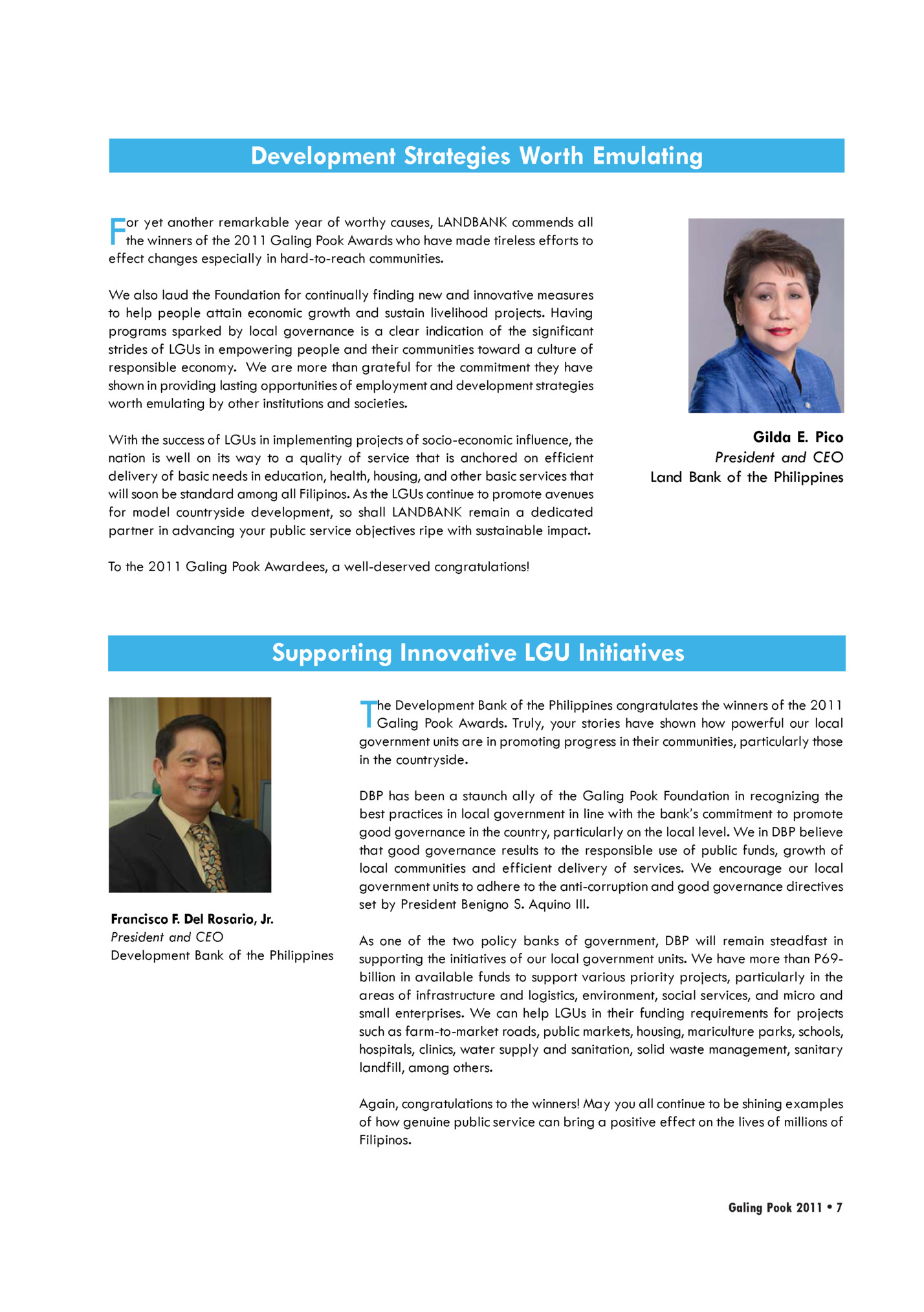
limited access of litigants and witnesses to the courts— physically as the farthest municipality is about 117 kilometers from the lone Regional Trial Court and financially as most of the litigants were impoverished and have limited funds to pursue court cases, let alone pay fare for transport. The confluence of these factors ustice dictates that the punishment should fit the left many of the detainees serving more than the crime. But in the real world, justice is not efficiently mandated length of sentence if they were convicted carried out. Take the case of the farmer in Sarangani of their crimes. who remained a detainee for 13 years for stealing a carabao and a cheap loaf of bread. The injustice of Armed with the findings, the Sarangani LGU designed his plight is so glaring especially when personalities JEEP to hasten the disposition of cases involving accused of graver crimes do not spend even a night indigent litigants whose family member remained a detainee in jail because of the slow pace of litigation. in jail. JEEP involved the provision of a mobile court dubbed There are other poor souls in Sarangani’s jail who “Justice on Wheels” or JOWs. Essentially, it is a bus remain detainees longer than they should because of that has been reconfigured into a court room so that the slow disposition of their cases. Learning about their hearings can be conducted inside it when the bus is plight prompted the provincial government to put in deployed to the municipalities. It is the only mobile place a program that would hasten the resolution of court with a permanently assigned judge and which court cases and reduce jail congestion. Thus, was born has been authorized by the Supreme Court to assist the Justice Enhancement and Empowerment Program the regional trial court. In 2008, this mobile court was deployed to the municipalities to improve access to (JEEP) in 2006. indigent litigants and witnesses. Sarangani’s jail was designed to accommodate only 220 inmates, but it is now home to more than 600. A As part of JEEP, an Alternative Dispute Resolution baseline study done by the LGU revealed that the component was institutionalized to encourage litigants jails are congested mainly due to the snail-paced to arrive at an amicable settlement instead of disposition of cases, which in turn was due to the very elevating their case to a court litigation. A Provincial limited number of trial courts. The study also cited the Mediation Center was established for this purpose. Justice on Wheels J 8 • Galing Pook 2011

Mediation (CAM) program of the Supreme Court, which involves court-trained mediators in the settlement of disputes. Lastly, JEEP also organized Barangay Justice Advocates (BJAs) who would detect and help settle brewing disputes at the community level so that the petty disputes are managed and do not needlessly get elevated to a lengthy trial process. When the program started, 60 percent of the pending cases at the RTC were turned over to JOWs for litigation, considerably de-clogging the docket of the RTC. The JOWs program has conducted hearings for more than a thousand cases since then. As a result, detainees who have practically been serving more lengthy sentences than if they were convicted have been released from jail. JOWs has also halved the number of provincial jail inmates from 600 to 286 as of June 2011and this has also translated into reduced maintenance expenses for the jail. Meanwhile, 43 percent of cases referred to CAM between 2008 and 2010 were successfully settled through mediation. Needless to say, this reduced the number of cases that were elevated to court litigation. More importantly, the community leaders who were trained as BJAs have been quite successful in resolving petty conflicts at the family or clan level. More Sarangani residents have also taken legal awareness trainings at the community level and this mechanism has effectively reduced the cases that get elevated to the Barangay Court and Trial Courts. CONTACT With so much accomplished in just a few years, the JEEP program indicates that the wheels of justice can spin much faster with the proper impetus. Sarangani’s example also shows that with a little inventiveness, poverty-stricken provinces can still make substantial gains even with very limited resources at their disposal. Gov. Miguel Rene A. Dominguez pgo_govmigs@yahoo.com Fax (083) 508-2258 “Justice on Wheels” is a bus that has been reconfigured into a court room. It is the only mobile court with a permanently assigned judge and which has been authorized by the Supreme Court to assist the Regional Trial Court. Galing Pook 2011 • 9
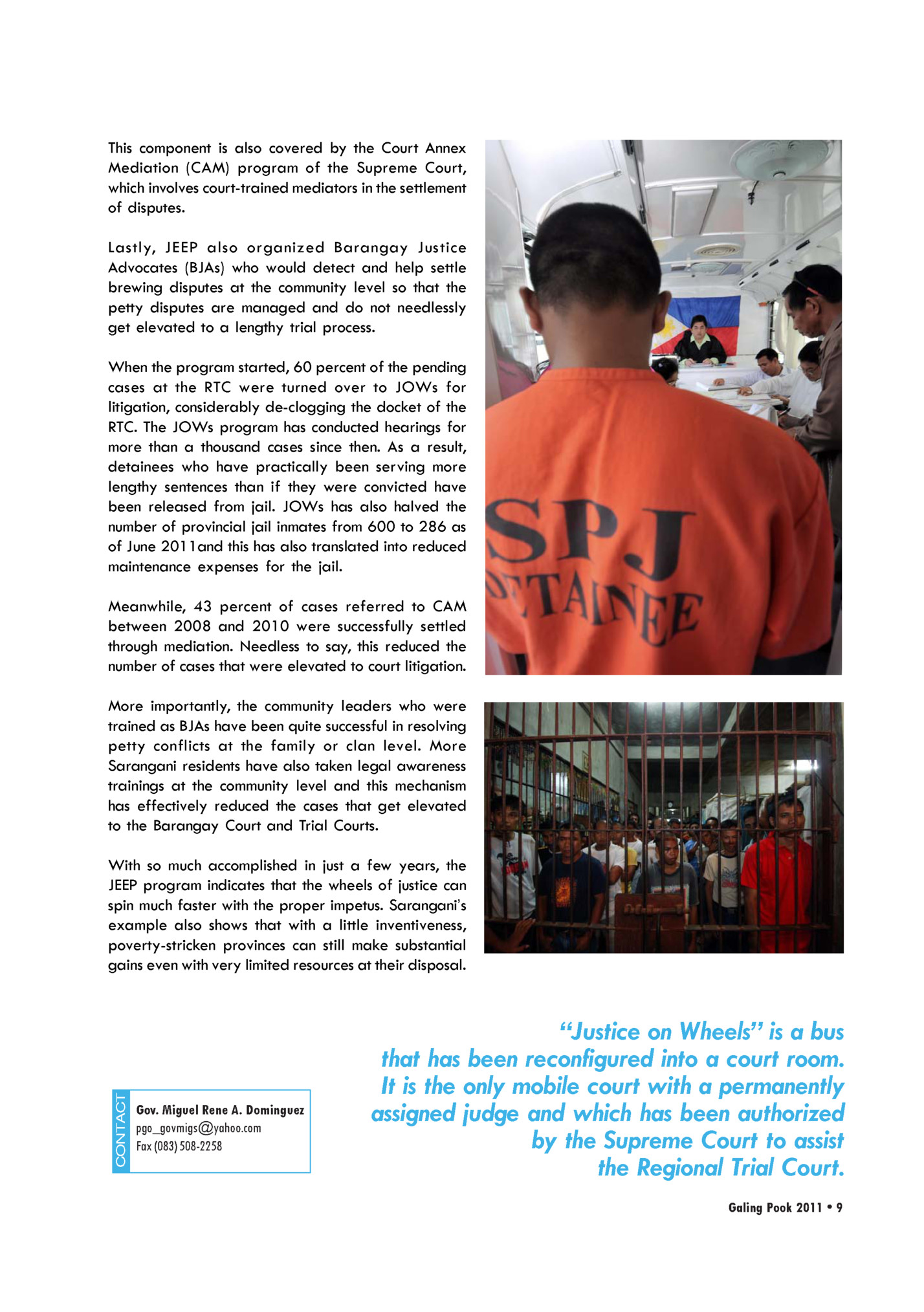
Fleepit Digital © 2021